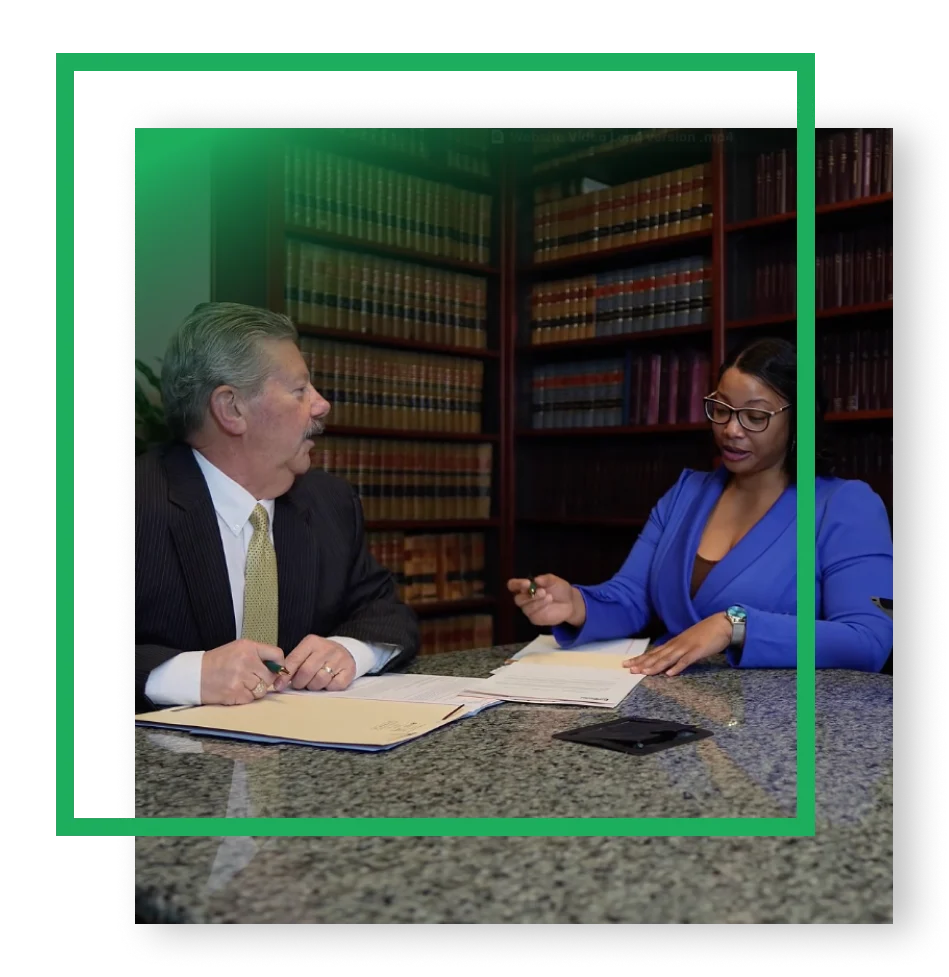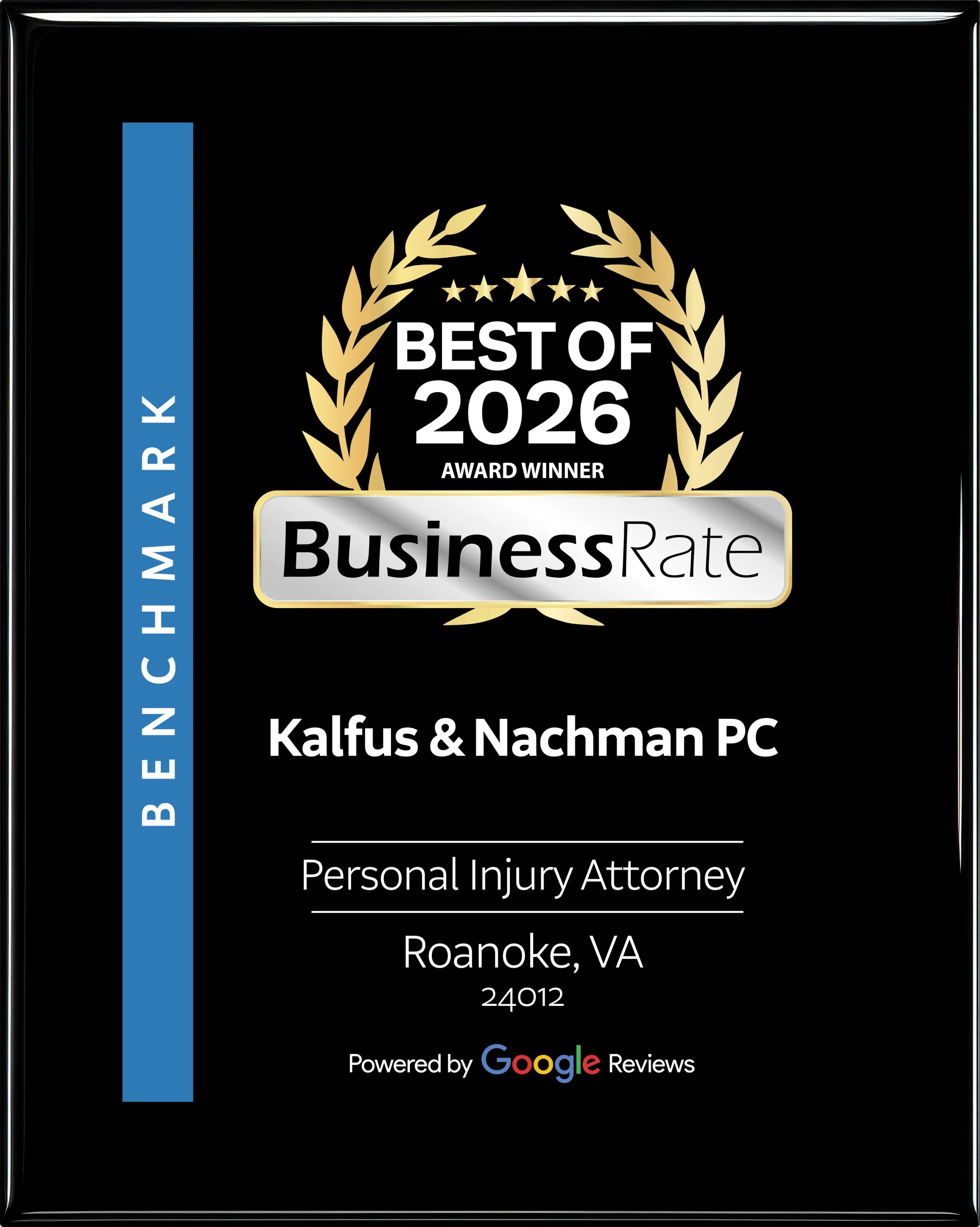
Roanoke Catastrophic Injury Attorneys
Helping Victims of Catastrophic Injuries in Roanoke, VA
When you are injured, you may be able to recover compensation for your medical bills, lost wages, and other damages. However, when you suffer a catastrophic injury, the stakes are much higher. Catastrophic injuries are those that result in permanent disability, disfigurement, or other long-term or life-altering consequences. These injuries are often severe and may require extensive medical treatment and ongoing care.
AtKalfus & Nachman PC, we understand the unique challenges faced by victims of catastrophic injuries. Our experienced lawyers are here to help you fight for the full, fair recovery you are owed. If you or someone you love has suffered a catastrophic injury, we encourage you to reach out to our team to learn how we can help.
Call (855) 880-8163 or contact us online today to request a free, no-obligation consultation with one of our catastrophic injury lawyers in Roanoke, VA.




our recent case results we mean business
Over a billion dollars recovered in settlements & Verdicts
-
$10.9 Million Traumatic Brain Injury
Settlement for our 2-year-old client who suffered a skull fracture and traumatic brain injury due to a faulty hotel balcony railing
-
$10.5 Million Truck Accident
Settlement for our client who suffered a traumatic brain injury from a truck accident
-
$7 Million Auto Accident
Settlement for our client who suffered severe and permanent back & spinal cord injuries resulting in paralysis
-
$5.147 Million Truck Accident
Settlement for our client who suffered a traumatic brain injury due to a tractor trailer accident
-
$2.15 Million Premises Liability
Settlement for our client who sustained multiple severe orthopedic injuries due to a ruptured steel tank

What is a Catastrophic Injury?
A catastrophic injury is one that results in long-term or permanent disability, disfigurement, or other life-altering consequences. These injuries are often severe and may require extensive medical treatment and ongoing care. In some cases, catastrophic injuries are fatal.
Some examples of catastrophic injuries include:
-
I had a wonderful experience with this company Jessie Suites and the whole Kalfus and Nachman family, and another special thank for her kindness and support, Ella Baskin. I really love y’all like family.- Latasha M.
-
I love this law firm. My lawyer was confident, worked with my needs, and got RESULTS. His name is Ryan Suit. Ella Baskin was also very helpful.- Jasmine G.
-
Happy with my choice of choosing this law firm to represent me with my case. I highly recommend anyone to use this law firm.- Christina
-
Ms. Vaughn is simply amazing, very professional, and helpful through my disability case... I highly recommend her to handle your case!- Michael W.
-
The law firm helped me throughout the long healing process and assisted me in getting a settlement.- April
-
Friendly and hard-working people. Always there for the client's needs. Will continue being a client for any other needs I may have.- Tanya N.
-
Patient, understanding, considerate, and loyal. These were the characteristic of Mrs. Carmen Caswell. Job well done!- Leroy M.
-
They did an excellent job with my case and had no issues or problems. Call the hurt line they can help.- Benjamin W.

roanoke, va catastrophic injury FAQ
-
How do catastrophic injury claims differ from other personal injury claims?
Catastrophic injury claims typically involve much higher damages because they account for lifelong medical care, lost earning capacity, and reduced quality of life. Insurance companies often fight harder to minimize payouts in these cases.
-
Who can be held liable for a catastrophic injury?
Liability depends on the circumstances of the accident. Responsible parties may include negligent drivers, employers, property owners, product manufacturers, or healthcare providers. In some cases, multiple parties may share liability.
-
Is there a time limit to file a catastrophic injury lawsuit?
Yes. In most cases, Virginia law gives injured victims two years from the date of the accident to file a personal injury lawsuit. Missing this deadline can prevent you from pursuing compensation.
-
Can I still recover compensation if I was partially at fault for my injury?
Virginia follows a pure contributory negligence rule, which means if you are found even 1% at fault for the accident, you may be barred from recovering compensation. This makes it critical to have an experienced attorney build your case.
-
How long does it take to settle a catastrophic injury claim in Virginia?
The timeline varies based on the complexity of the case, the extent of injuries, and whether the case goes to trial. Some claims may resolve in several months, while others can take years if litigation is required.
-
Do catastrophic injury claims usually go to trial?
Many are settled out of court, but due to the high value of these claims, insurance companies may refuse to pay full compensation. In those cases, your lawyer may recommend going to trial to secure a fair outcome.
-
Why do I need a lawyer for a catastrophic injury claim?
Catastrophic injury claims are complex, involving medical experts, financial projections, and often aggressive insurance defense tactics. Our Roanoke catastrophic injury attorneys at Kalfus & Nachman PC can investigate liability, calculate damages, negotiate settlements, and represent you in court if necessary.


A Powerful Team in Your Corner what sets us apart
-
Built to Battle
We know how insurance companies try to limit claims — and after 45+ years, we know exactly how to stop them.
-
Serving Since 1979
For over four decades, we've guided thousands of Virginia clients through complex legal challenges, earning trust through proven results.
-
Complete Legal Coverage
Personal injury, workers' compensation, Social Security Disability — no matter your situation or location across Virginia, our team is here to provide comprehensive legal support.
-
Millions Recovered
From a $10.9M TBI settlement to a $7.1M truck accident recovery — we've secured the financial support our clients need, and we're ready to fight for yours.







